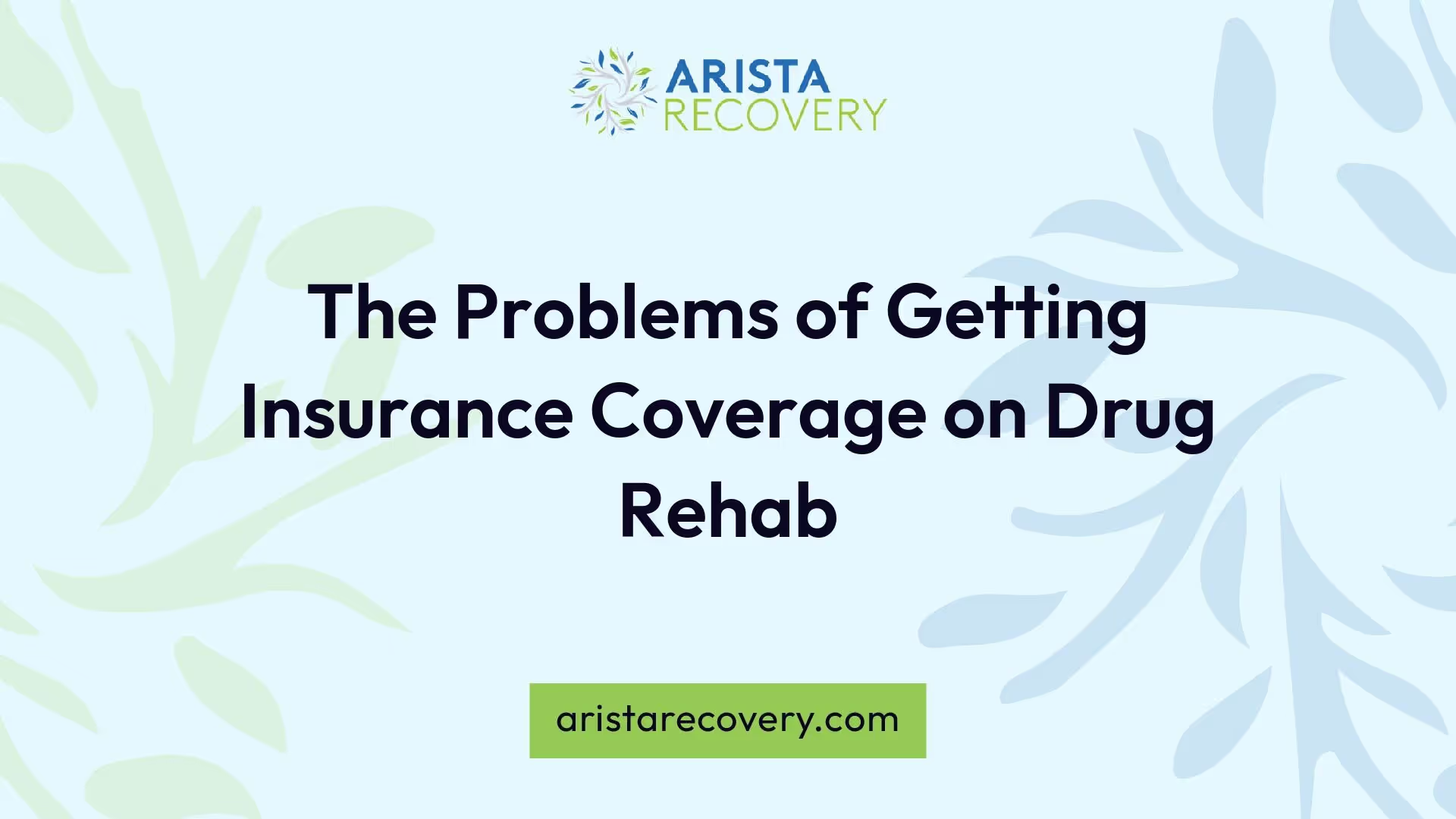
The Problems of Getting Insurance Coverage on Drug Rehab
Navigating Insurance Coverage
Navigating the complexities of insurance coverage can be daunting for individuals seeking substance abuse treatment. Understanding the various options available, including state-funded programs and federal benefits, is crucial for those facing challenges related to securing coverage for drug rehabilitation.

Accessing State-Funded Programs
For individuals with no insurance or those who are underinsured, resources are available through the Substance Abuse and Mental Health Services Administration (SAMHSA). SAMHSA's National Helpline can connect individuals to their respective state offices, which manage state-funded treatment programs. These programs may also include facilities that operate on a sliding fee scale or accept Medicare or Medicaid.
State-funded programs aim to provide access to essential addiction treatment services. However, it is important to note that not all treatment centers accept Medicaid as a form of payment, leading to potential gaps in coverage.
State-Funded ProgramsDescriptionSAMHSA National HelplineRefers individuals to state treatment programsSliding Fee Scale FacilitiesCharges based on income for those without insurance
Understanding Medicare and Medicaid Benefits
Medicare and Medicaid provide essential coverage for individuals seeking addiction treatment. Medicare, particularly Parts A and B, offers specific benefits related to substance abuse therapy:
Medicaid, on the other hand, is a public health insurance program designed for low-income families. It encompasses basic elements of alcohol dependency recovery, such as inpatient care and outpatient visits. Despite these benefits, not all treatment facilities accept Medicaid, which can pose significant challenges for individuals looking to utilize this coverage (AAC - American Addiction Centers).
Medicare BenefitsCoveragePart AHospitalization for substance abuse treatmentPart BPartial hospitalization and outpatient services
Understanding these programs is key to addressing the problems of getting insurance coverage for drug rehabilitation. By knowing how to access state-funded programs and leveraging federal benefits, individuals can better navigate the healthcare system to secure the necessary treatment for addiction.
Private Health Insurance Options
Understanding private health insurance options is crucial when navigating the complexities associated with addiction treatment coverage. Several major providers offer plans that may include benefits for drug rehab, along with various considerations that impact coverage.
Coverage from Major Providers
Numerous private insurance companies provide coverage for addiction treatment and recovery services. Some of the notable providers include:
Insurance ProviderPotential Coverage for Drug RehabAetnaYesAnthem Blue CrossYesBeacon HealthYesBlue Cross Blue ShieldYesComPsychYesCignaYesFirst Health NetworkYesHealth NetYesHumanaYesMagellanYesMHNYesMultiPlanYes
The Affordable Care Act of 2010 mandates that new small group and individual insurance plans cover ten essential health benefits, among them mental health and substance use disorder services. Medicare also offers coverage under Parts A and B, providing for hospitalization and outpatient treatment services (Affordable Care Act).
Factors Influencing Coverage
Several factors determine the extent of coverage provided by private insurance plans for drug rehabilitation services. Important considerations include:
Understanding the various private health insurance options and the associated factors is vital for those seeking drug rehab coverage. With careful planning and knowledge of available resources, individuals may navigate the challenges of securing insurance coverage for addiction treatment.
Challenges in Securing Coverage
Securing insurance coverage for drug rehabilitation can be fraught with obstacles. These challenges can complicate access to necessary treatment and often result in delayed services or unexpected costs.
Pre-Authorization Requirements
Many insurance plans impose pre-authorization requirements before approving treatment coverage. This means that the treatment facility or provider must obtain approval from the insurer prior to delivering services. If this approval is not secured, claims for treatment may be denied, resulting in unexpected out-of-pocket expenses for individuals seeking help (Attain Behavioral Health).
Common Pre-Authorization ChallengesDescriptionComplexity of ProcessThe process can be convoluted, requiring specific documentation and justification.Time DelaysProcessing times may lead to delays in starting treatment.High Denial RatesA significant number of pre-authorizations can be denied, leading to appeals.
Understanding these factors can help individuals navigate the complexities of insurance coverage more effectively (Attain Behavioral Health).
In-Network vs. Out-of-Network Providers
Another significant challenge in securing coverage relates to whether a treatment provider is in-network or out-of-network. Insurance plans typically offer better coverage and lower out-of-pocket costs for in-network providers. However, many individuals may find that their preferred or locally available treatment centers are out of network, which can lead to higher costs or denial of coverage altogether.
In-Network vs. Out-of-NetworkIn-NetworkOut-of-NetworkCoverage PercentageGenerally higher coverageLower coverage or no coverageCost to PatientLower out-of-pocket costsHigher out-of-pocket costsAccess to ServicesMore accessible services and optionsLimited options, may require referrals
Some providers have reported administrative burdens when billing Medicaid and other insurance for substance use disorder (SUD) treatment services. This includes frequent denial of claims and the need for prior authorizations, making it financially challenging for many facilities and patients (NCBI).
Understanding the implications of in-network versus out-of-network providers may help individuals strategize their approach to securing insurance coverage for drug rehabilitation treatment effectively.
Maximizing Insurance Benefits
Understanding how to maximize insurance benefits can significantly ease the financial burden associated with drug rehab. Effective communication and utilizing employer-sponsored plans can make a notable difference in securing coverage and treatment access.
Communicating with Plan Administrators
Engaging with plan administrators is crucial for navigating insurance coverage for rehabilitation services. Individuals should initiate contact with their insurance provider to clarify the specifics of their plan. This communication is essential for understanding what aspects of treatment for substance use disorders are covered and what out-of-pocket expenses might be incurred (American Addiction Centers).
It is beneficial to gather relevant information before the conversation, such as:
By providing this information, individuals can receive tailored guidance on coverage specifics. Additionally, maintaining an open dialogue with the staff at addiction treatment facilities can help facilitate a smoother process. These professionals often have experience dealing with insurance providers and can assist in addressing any questions or concerns.
Utilizing Employer-Sponsored Plans
Employer-sponsored health plans can often provide significant benefits for substance abuse treatment. Numerous private insurance companies cover addiction and substance abuse treatment, such as Aetna, Anthem Blue Cross, Beacon Health, Blue Cross Blue Shield, ComPsych, Cigna, First Health Network, Health Net, Humana, Magellan, MHN, and MultiPlan (Ranch Creek Recovery).
To make the most of employer-sponsored plans, individuals should:
Table: Coverage by Major Private Insurance Providers
Insurance ProviderSpecific Coverage for Addiction TreatmentAetnaYesAnthem Blue CrossYesBeacon HealthYesBlue Cross Blue ShieldYesCignaYesHumanaYes
By efficiently utilizing employer-sponsored plans and keeping open lines of communication with plan administrators, individuals can enhance their chances of receiving the necessary support and treatment for addiction without the burden of excessive financial strain.
Gaps in Coverage
Understanding the limitations in insurance coverage for drug rehabilitation is essential for those seeking treatment for substance use disorders. This section will discuss the issues with Medicaid coverage and the limitations under the Affordable Care Act (ACA) and parity laws.
Insufficient Medicaid Coverage
Medicaid serves as the public health insurance program for low-income families, providing basic coverage for substance use disorder treatment. While it often covers necessary services like inpatient care and outpatient visits, there are significant gaps in what is offered. Not all rehab facilities accept Medicaid, leading to limited options for individuals in need of care (AAC - American Addiction Centers).
Further deficiencies arise concerning specific treatments. For example, in states like Connecticut and Kentucky, Medicaid does not cover certain effective treatments such as methadone. Additionally, Wisconsin has determined that residential or intensive outpatient treatments fall outside the scope of what Medicaid will fund based on their interpretation of medical necessity and coverage criteria (NCBI).
StateTreatment TypeCoverage StatusConnecticutMethadoneNot CoveredKentuckyMethadoneNot CoveredWisconsinResidential/Intensive OutpatientNot Covered
Limitations Under ACA and Parity Laws
The Affordable Care Act of 2010 attempted to address some of the issues surrounding health coverage for substance use disorders by mandating that new small group and individual insurance plans cover essential health benefits, including mental health and substance use disorder services. This requirement was aimed at ensuring parity between mental health and general medical care (AAC - American Addiction Centers).
Despite these advancements, significant issues still exist that can create barriers for those seeking drug rehab coverage. Parity laws, while intended to provide equal treatment, can often be inadequately enforced. Patients may find that their insurance providers implement coverage limits, excessively high co-payments, or require pre-authorization for treatment that are not common in other areas of health services.
Parity Law AspectDescriptionCoverage RequirementsMust cover mental health and substance use treatmentEnforcement ChallengesInadequate enforcement leading to discrepanciesCost Sharing LimitationsHigher co-pays/limits affecting access
The combination of insufficient Medicaid coverage and the limitations under the ACA and parity laws creates significant challenges for individuals seeking treatment for substance use disorders. These issues underscore the broader problems getting insurance coverage for drug rehab, which continues to hinder many from accessing necessary care.
Overcoming Administrative Hurdles
Navigating insurance coverage for drug rehabilitation can be complex, particularly when it comes to administrative duties and restrictions. Understanding billing challenges faced by providers, as well as the limitations imposed by insurance companies, is vital for individuals seeking treatment.
Billing Challenges for Providers
Providers of substance use disorder (SUD) treatment often experience significant difficulties when it comes to billing Medicaid and other insurance plans. These challenges can include the need for prior authorizations, inconsistent reimbursement rates, and frequent claim denials, which lead to burdensome appeals processes. Many facilities have reported that these administrative burdens make it difficult to sustain their services (NCBI).
Billing ChallengeImpact on ProvidersNeed for prior authorizationsDelays in treatment accessFrequent claim denialsIncreased administrative workloadLow reimbursement ratesSome providers opt not to accept insuranceAppeals processesConsumes time and resources
Insurance Restrictions and Limitations
Insurance companies impose several restrictions and limitations that can complicate access to necessary treatment for individuals with substance use disorders. These include constraints on the number of treatment sessions, limitations on the number of required urine drug screens, and varying reimbursement rates for the same services under different Managed Care Organizations (MCOs). Claims are often denied, further complicating the recovery process. Many treatment facilities have expressed frustration over these regulations, which can lead to significant delays and access issues for patients seeking help (NCBI).
RestrictionEffect on Treatment AccessLimits on treatment sessionsPotentially insufficient careConstraints on urine drug screensMonitoring challengesPrior authorization requirementsIncreased delays in starting treatmentVarying reimbursement ratesFinancial burden on treatment facilities
Insurance providers and rehabilitation facilities must work collaboratively to streamline the payment process and alleviate concerns related to administrative burdens. Efficient communication between these entities can foster a smoother recovery journey for individuals in need of substance abuse treatment (American Addiction Centers).
When mental health challenges and addiction intersect, it can feel isolating. At Arista, we offer compassionate, evidence-based, and trauma-informed care to help you heal, grow, and move forward.
You’re not alone in this.
When mental health challenges and addiction intersect, it can feel isolating. At Arista, we offer compassionate, evidence-based, and trauma-informed care to help you heal, grow, and move forward.
Support that moves with you.
You’ve taken a brave first step. At Arista Recovery, we’re here to help you continue with best-in-class care designed for long-term healing and support.
.webp)






